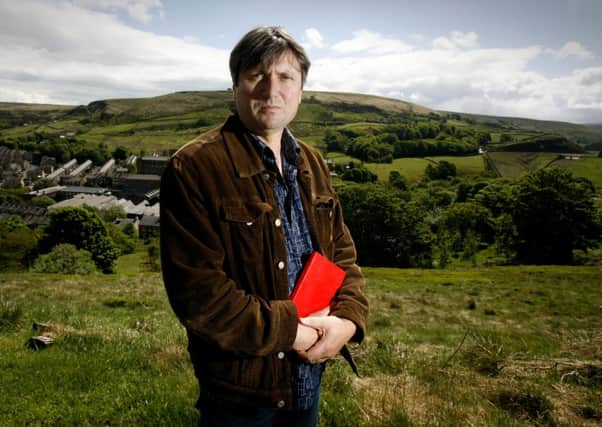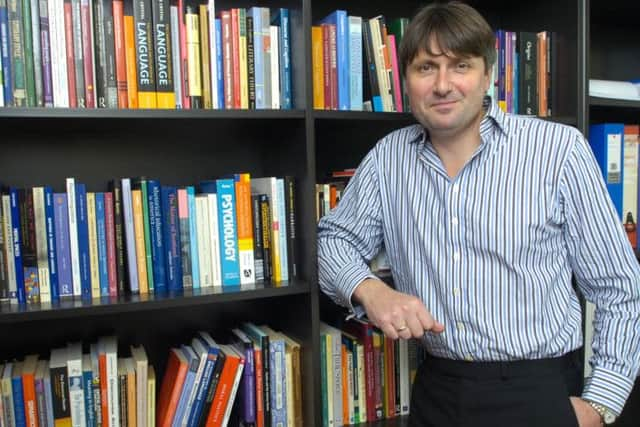All points north: Simon Armitage celebrates 25 literary years


IN the music world rock bands usually release their “best of” albums either because they’ve split up or they’re past their prime and want to milk the cash cow one last time.
Poetry, on the other hand, isn’t known for being lucrative and even if a poet has the talent and good fortune to make a name for themselves, having their “selected poems” published is quite often a sign they have shuffled off this mortal coil.
Advertisement
Hide AdAdvertisement
Hide AdNot so with Simon Armitage. The Marsden-born poet is very much alive and flourishing. We meet in a busy cafe full of chattering students on the campus of Sheffield University where he is Professor of Poetry.


His latest volume, Paper Aeroplane, covers his entire career stretching from his acclaimed debut, Zoom! in 1989, right through to his forthcoming collection The Unaccompanied due out next year.
He’s been a fixture on our literary landscape for a quarter of a century now and is regarded by many as one of the world’s foremost living poets. A good moment, then, for a spot of quiet reflection – something poets tend to be good at. “I actually did a ‘selected’ book about 13 years ago but I’ve published a huge amount of stuff since then and it felt out of date. So I thought it was probably a good time to reframe it. Plus, I got tired of dragging about 20 books around to readings,” he says.
Armitage has become a familiar voice and face during the intervening years having spread his creative wings. He’s written a couple of novels and presented TV documentaries, including the splendid Gods and Monsters – Homer’s Odyssey for the BBC, and he’s translated ancient works such as Sir Gawain and the Green Knight.
Advertisement
Hide AdAdvertisement
Hide Ad“I don’t like looking back, I’ve got this idea you should always be moving forward. Quite often by the time a lot of projects I’ve been working on arrive on TV or get published I’m deep into something else.”
It’s his poems, though, for which he’s best known. His Yorkshire roots give his poetry a distinct rhythm, his deadpan delivery as sharp as an easterly wind blowing over the Pennine hills.
“I agonised for quite a long time about the process for choosing these poems,” he says, referring to Paper Aeroplane. “I was trying to think of a metaphor for what I was doing, but I couldn’t find a yardstick so in the end I just stood by the photocopier one afternoon with all the books on one side and went through them page by page saying ‘yes’ or ‘no’.”
He feels there have been subtle, rather than dramatic, changes in his work over the years. “If I look at the last poem in the book and the first one they look pretty similar in shape and style. There’s still that same easy going attitude being explored.”
Advertisement
Hide AdAdvertisement
Hide AdHis poems might be easy going and accessible, but he finds the process of writing them far from relaxing. “It’s full of anxieties. I don’t think I have that natural writing style that other people have. I know that other poets write poems in a couple of days, I don’t. Even the short ones are developed over at least a month.
“Sometimes what gets in the way of the poems is language. I know that’s contradictory and I’m never short of ideas but an idea isn’t a poem, you then have to sit down and start grappling with writing , language and vocabulary and that’s what takes time.”
Poets aren’t known for being prolific – just look at Philip Larkin who averaged one thin, albeit brilliant, volume a decade – but Armitage has already amassed 19 poetry volumes, not to mention a string of awards to his name. “There’s a restlessness in me that always wants to work and I’m just as curious as when I started. I’ve always said the great enemy for me would be some sort of assumed wisdom and I’ve never felt that I’ve got anything to tell anybody that they didn’t know themselves.”
Armitage was raised in West Yorkshire, where he still lives today. Although he didn’t belong to a bookish family they possessed that quintessential dry Yorkshire wit. “My family are also good talkers and quick witted and I wasn’t always the sharpest around the table. I wanted to participate in all that but I wasn’t quick enough on the draw to make that through conversation so in some ways poems became my contribution to that family conversation.”
Advertisement
Hide AdAdvertisement
Hide AdHe was about 15 when he awoke to the possibilities that poetry offered, impressed by the work of Larkin, Sylvia Plath and, in particular, Ted Hughes, whose animal poems he likens to “little acts of magic”.
He left Yorkshire to study geography at what was Portsmouth Polytechnic. By the time he returned in 1984 he had started writing poems although it was something he did under the radar.
Having done an MA thesis examining the effects of television violence on young offenders he took a job as a probation officer in Oldham. It was this, he feels, that gave him his work ethic. “I grew up in that era of Thatcher’s Britain when people worried about not having any work and definitely in the early stages the poetry was a release valve from work.”
His early poetry was imitative but started to evolve once he began attending writing classes. “I went to some poetry workshops at Huddersfield Poly run by Peter Samson and he, in lots of ways, was my teacher and a real access point for me in terms of getting hold of books.”
Advertisement
Hide AdAdvertisement
Hide AdLooking back he feels he was almost living two different lives. “I was a probation officer by day and a poet by weekends and bank holidays,” he says. “I was playing football and cricket for the village and I didn’t have enough confidence to tell people I was a poet, whereas now I’m completely comfortable with that.”
Despite such diffidence there was also a determination to master the craft. “There were times when I wouldn’t even go to the writing workshops or I wouldn’t go to the pub because I was at home writing poems. I felt as if I was on to something. I wanted to get published but I certainly didn’t imagine it would mean that a few years later I would be leaving my job.”
So when Zoom! was published it was the culmination of years of hard work. “There’d been a period of four or five years of experimenting and trying to find a voice – I still had enough rejection slips from magazines to wallpaper a back bedroom.”
He became synonymous with a clutch of young poets dubbed “the New Generation” who, in keeping with the notion that poetry was “the new rock ‘n’ roll”, went on tour together.
Advertisement
Hide AdAdvertisement
Hide AdPoetry and music are in many ways natural bedfellows and Armitage himself dabbled with the latter when he and some friends formed a band called The Scaremongers in 2008. “When we were younger we had this notional band and we had dreams of what we would do. The fact we never wrote any songs or had any instruments didn’t matter.”
But 20-odd years later this “notional” band became a real one when they did a series of gigs, including at Latitude Festival, culminating in a show at Wakefield’s Theatre Royal. “We sounded great. We had a proper PA system and I remember turning round after the first song and saying to the guys ‘we sound like a band’.”
But his family are a little less enthused. “My daughter calls it ‘indie dad-rock’, I’m not sure that’s a genre that comes up in iTunes,” he says.
For Armitage, though, music will probably always play second fiddle to poetry. “I’ve always seen it as a very powerful force that doesn’t need to be confined within the covers of a book. I like the idea that it’s a ‘go anywhere’ art that pre-dates literature and goes back thousands of years to the temples and campfires.”
Advertisement
Hide AdAdvertisement
Hide AdDespite its ancient heritage he doesn’t believe poetry has lost its relevance as some predicted. “Its status hasn’t diminished in relation to other art forms and I actually see a lot of younger people still wanting to read it,” he says.
“It’s stitched into the historical consciousness of this country and you could never start to unpick it. My feeling is poetry will always be one of the jewels in our artistic crown. I travel quite a bit these days and when you’re abroad if you want to offer a kind of touchstone to somebody the thing they know about are poets. “If you say ‘Shakespeare’ or ‘Chaucer’ or ‘Keats’, you’re connecting with people.”
Which brings us to another poetic totem, Ted Hughes, who Armitage met on several occasions. He describes him as “magnetic” and a “planetary” being.
“Those meetings were very lopsided because I was in awe of him. He had deep philosophical concerns but his poetry is still incredibly approachable, even for kids. He had that common touch which I think of as a Yorkshire trait, because we have a history in this county of performance and home-made entertainment, whether it’s in a Wesleyan chapel, or local am dram.”
Advertisement
Hide AdAdvertisement
Hide AdIt’s something he associates with other great Yorkshire artistic figures.
“People I admire like Alan Bennett, Alan Ayckbourn, David Hockney and Tony Harrison, as well as having great integrity about their art want to make contact with readers, or listeners or viewers.”
They are, like Armitage, all good communicators. “It comes naturally,” he says, smiling. “…it’s in the water.”
• Paper Aeroplane – Selected Poems 1989-2014, is published by Faber & Faber, priced £14.99.